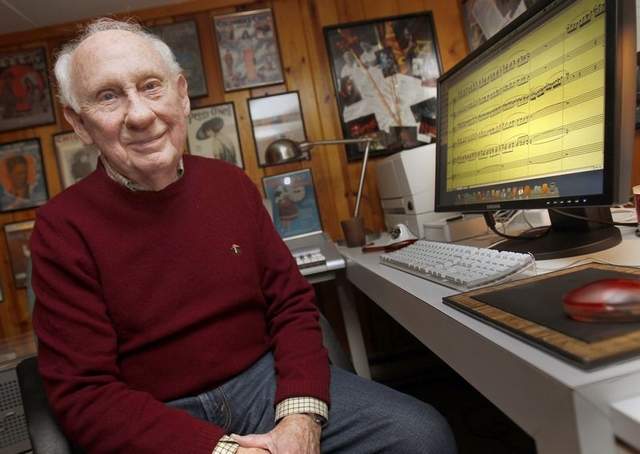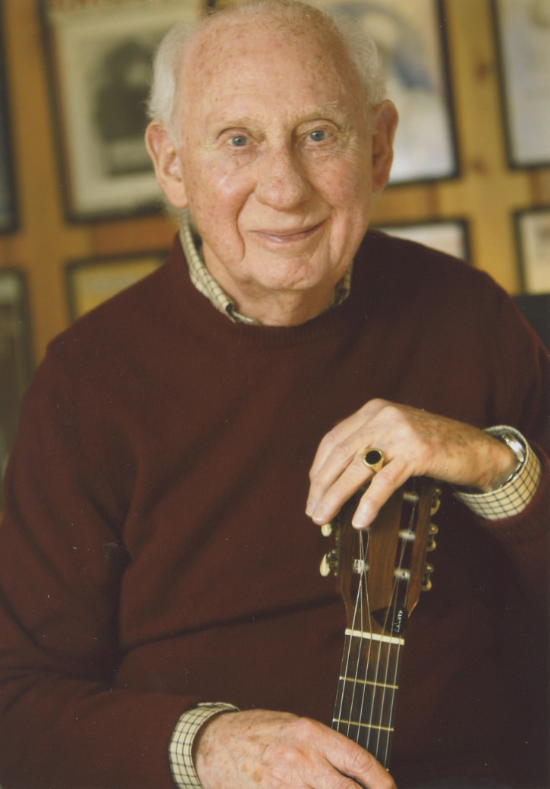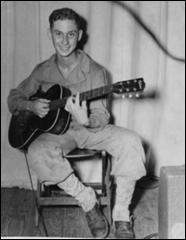Sounds of the Season
Composer Maury Laws set the tune for television’s most beloved holiday programs
For music fans worldwide, Appleton resident Maury Laws embodies the spirit and sounds of Christmas. Laws served as musical director for the 1964 animated television special “Rudolph the Red-Nosed Reindeer” – the longest continuously-running Christmas special in history.
Laws also composed, arranged, orchestrated and directed music for dozens of other Christmas programs including “Frosty the Snowman,” “Santa Claus is Comin’ to Town” and “’Twas the Night Before Christmas.”
At 94-years-old, Laws says his success in the early era of television was the result of his undying love for music.
“I started out, like most people, loving something and searching out people who knew better than I and pounding them with questions,” he says. “The idea is to find how to use [your passion] in many ways and it just comes from loving something while you do it.”
A Musical Foundation
 Laws spent the first 10 years of his life growing up on a small tobacco farm in North Carolina.
Laws spent the first 10 years of his life growing up on a small tobacco farm in North Carolina.
“From my earliest memory, I loved music,” he says. “People said when I could talk, I could sing.”
As a child, Laws carried a pouch in which people placed nickels and dimes in exchange for a song. He distinctly remembers sitting in a rocking chair singing old folk tunes, like “The Spanish Caviller,” with his mother providing backing vocals.
At age 12, Laws bought a guitar for $3 which set him on his musical path. He learned to play country and pop music, mimicking the sounds he heard on the radio. By 16, he was a featured soloist with local dance bands and jazz groups and was the youngest member of the local orchestra on weekends.
Laws served in the U.S. Army during World War II from 1943 to 1946. After returning from the war, he performed with musical groups along the East Coast before eventually settling in New York. There, he began to study music.
“Over a period of 10 years I studied in my spare time with a couple of very good teachers,” Laws says. “I didn’t go to college, but I made a living singing during what they called ‘The Golden Age of Television.’ It wasn’t really golden, because no one knew what they were doing.”
As big bands waned, Laws toured with the Vaughn Monroe Orchestra and appeared with vocal groups on the Perry Como, Arthur Godfrey, Milton Berle and Ed Sullivan shows. As a freelancer, he wrote and performed advertising jingles for General Electric, Eastman Kodak, American Motors, Firestone and Revlon.
Laws became a respected composer and performer in the early days of television, but his breakout work was still ahead of him.
Composing Christmas
Through his work with General Electric, Laws met Jules Bass who had recently co-founded Rankin/Bass Productions, which would become known for its stop-motion animated holiday specials.I
In his first job as a musical director, Laws worked on the 1964 Christmas television special “Rudolph the Red-Nosed Reindeer” produced by Rankin/Bass Productions. The special featured the Johnny Marks song of the same name. As musical director, Laws arranged Marks’ songs for a full orchestra and adapted the parts for instrumentalists and vocalists. This included reworking all the vocals when actor Burl Ives was brought on to narrate the story as Sam the Snowman.
“Like a director tells people how to act, the musical director tells them how to perform, what to do and when to do it,” Laws says. “You are in charge of all the musical sounds and how they integrate into the show. Music in film is used to say what you can’t say verbally.”
In 1964, “Rudolph the Red-Nosed Reindeer” was originally only budgeted to air twice on NBC. It’s original air date was December 6, which happens to be Laws’s birthday, a fun coincidence. However, the program has aired multiple times every year for the past 54 years. The music in particular has stood the test of time.
“The songs were very simple,” Laws says. “It’s done more in a classic style and they’ve never gotten old.”
After Rudolph, Laws composed, arranged and conducted music for roughly 25 Rankin/Bass television specials and films including “The Hobbit” which won a Peabody Award and was nominated for both a Grammy and an Emmy Award.
While working in New York, Laws met his wife, Karen, a Kaukauna native and former NBC News producer. Karen recalls Laws in their apartment composing music in ink on large sheets of score paper that would be transcribed by a copyist for the various orchestral parts.
“It was like watching a monk,” she says. “When he wrote, all that existed was that giant piece of paper.”
At Home in Appleton
The Lawses relocated to Appleton in 1985 to be closer to Karen’s family. Once here, Laws developed relationships with the Fox Cities Performing Arts Center, Lawrence University and Fox Valley Symphony Orchestra. He composed several pieces for the symphony’s pops concert series.
Regular Fox Cities P.A.C. attendees hear his work at each performance – Laws composed the “fanfare” that signifies the show is about to begin. He later used these few notes as the basis for a piece composed for the P.A.C.’s 10th anniversary which was performed by the BBC Concert Orchestra with conductor Keith Lockhart.
Laws, who admits not really watching his holiday TV specials, says it wasn’t until moving to the Fox Valley that he saw the widespread impact of his work.
“I didn’t know that New York was cynical about it. When we came out here, I saw that these shows were truly part of Christmas for people. I was surprised and pleased,” he says.
The music from these classic holiday programs touched the hearts of viewers in the ‘60s and they continue to do so more than 50 years later. Laws still receives weekly fan mail for the music he arranged and composed all those years ago. Letters come from as far away as South America, Australia and Japan.
“I’ve had lots of mail from parents who watched the programs and are now watching with their children or grandchildren. Sometimes people want an autograph,” he says, “and sometimes it’s just ‘Thank you for the music.’”














Leave a Comment